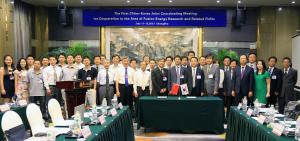China and Korea elaborate plans for joint research
17 Sep 2013
Working toward fusion energy: the first China-Korea Joint Coordination Meeting for the development of fusion energy and the joint implementation of the ITER Project.
A bilateral meeting was held between China and Korea on 11-12 July in Changsha, China to promote collaboration on the development of fusion energy and the joint implementation of the ITER Project.
This first Joint Coordination Meeting (JCM-1) took place between representatives of the Chinese MOST (Ministry of Science and Technology) and Korea's MSIP (Ministry of Science, Information and Communication Technology, and Future Planning), with representatives of the Chinese and Korean Domestic Agencies for ITER, national fusion institutes, and universities present. The meeting was chaired by Linhao Chen, Deputy Director-General of MOST's Department of International Cooperation.
Exchanging information on their respective fusion programs, the delegations elaborated plans for joint research and workshops and the exchange of information and personnel.
The meeting took place on the heels of an encounter in June 2013 between Chinese President Xi and Korean President Park. Geun Jae Lee, head of the Korean delegation and Director-General of the R&D Policy Bureau of MSIP, underlined the meaningfulness of JCM-1 meeting in this context, expressing his confidence in the contribution of the two countries to ITER Project and fusion energy commercialization.
"This was a milestone meeting," said Luo Delong, acting head of the Chinese Domestic Agency, "one which I am sure will encourage stronger cooperation and further the relationship between our two countries."
Kijung Jung, head of the Korean Domestic Agency, emphasized the longtime friendship between the two countries in working toward fusion energy development and shared his belief that they would play an important role in the success of ITER Project.
The next bilateral meeting should take place in July 2014 in Korea.


